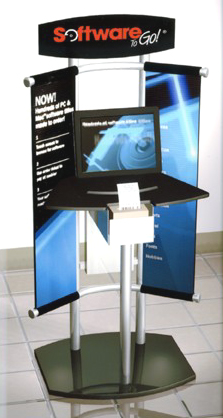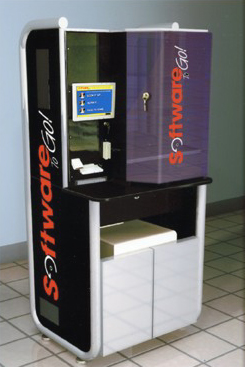Article
Pairing retail software with kiosks
CompUSA deal allows New York-based kiosk developer to continue testing feasibility of software-ordering kiosks.
February 18, 2002
For any dedicated techie, days spent in front of the computer entail a variety of options. There are bills to pay, papers to write, and of course there is fun to be had. Games, educational programs, and business products are all part of the computer experience.
With the variety of software applications there is a cornucopia of choices at the local software or office supplies store. Racks of cardboard boxes with shiny graphics and sharp imagery vie for the customer's attention. Is it Reader Rabbit or Jump Start software for the kids. Do you buy Quicken or a Microsoft financial program for your home budgeting needs. Which of the seemingly infinite number of NFL computer games will you choose for your downtime activities.
Protocall Technologies Inc. is not in the business of telling you which software titles to buy - you are still on your own with those decisions. But the Commack, New York-based company is experimenting with new ways to move the software into the shopping bag.
Protocall announced in mid-January that it would launch a test program of its SoftwareToGo electronic software delivery system at three CompUSA locations. The kiosk-based system is in its second test program, having been tested by Office Depot and The WIZ last year.
Protocall founder and chief executive officer Bruce Newman believes he has uncovered a possible killer application for the kiosk industry: a product that delivers a specific, popular service in a way that cuts down on footprints. The key is keeping customers and retailers alike happy, and Newman believes his company's product does that.
"It increases the availability of software for consumers and eliminates the costs for maintenance inventory," Newman said.
Where's the software?
Instead of racks and racks of software, SoftwareToGo runs off two stations.
One consists of a touchscreen kiosk where customers browse through software titles and make their selection. The second unit is a burn-to-order station that burns the software program onto a CD-ROM while the customer pays for it. The CD comes with full-color packaging and a certificate of authenticity.
To make a concept such as SoftwareToGo successful, the system must contain a wide selection of popular titles, plus there needs to be a customer convenience component as well.
 |
Customers can order software programs at Protocall Technologies's kiosk. |
On the software availability side, Protocall has licensing agreements to offer about 900 titles from around 70 software publishers. Among the publishers are four of the leading software producers in the country - Symantec, Electronic Arts, Infogrames Entertainment, and Network Associates.
"When we ran our first test program last year, we had about 150 titles from 15 publishers," Newman said. "The momentum continues."
The touchscreen provides complete product descriptions, including system specifications, rebate offers, and product age ratings (similar to movie ratings).
"The order-screen was designed to move consumers as quickly as possible
through the product search process," Newman said. "Our system provides a substantially better presentation to consumers than a box could ever do."
The system runs off a Windows XP operating system with Protocall monitoring each system from its New York headquarters. Newman would not disclose how much each unit costs to produce.
Last year's test, which took place in 11 Office Depot and The WIZ locations, offered Newman a glimpse of what his company faced in bringing this product to the market. The one thing that kept coming back to the company was that the software needed to burn on to the CD faster. Newman said that has been accomplished with the new SoftwareToGo units.
"They're about twice as fast as the first version, so that's an improvement," he said. "We just put 24X (CD burner) drivers in the computers, so the average product burning time is about 2 ½ minutes. We're way under what we used to be."
Your new middleman
CompUSA's program will take place at a store in Long Island and two in Texas. Newman said the company may do a national roll-out potentially involving 225 stores if the program works out.
"When we can offer a virtually limitless number of titles to our customers without increasing store shelf space through the SoftwareToGo product, we think it's a win-win solution," Larry Mondry, CompUSA chief operating officer, said in a news release. "We are examining the system very carefully and exploring the potential for installation in our retail stores."
 |
While customers pay for the software, the second unit of Protocall's system burns the program on a CD-ROM. |
CompUSA spokesperson Peggy Lane said the company did not want to comment any further, preferring to wait and see how the test program turns out.
Newman envisions his company becoming a middleman between software manufacturers and retail customers.
Under the business model Protocall is working with, the company licenses products from software publishers and places the software in its system. The kiosks are then placed in retail stores at Protocall's expense, with the customers buying the software for a typical retail price, and the store getting an unspecified percentage of the revenue.
As Newman sees it, everyone benefits from the deal. The consumer has access to hundreds of software titles, the retailer frees up room for more stock by eliminating rows of software space, and Protocall generates revenue by marking the software up to a typical retail rate.
But Newman is quick to warn that the middleman model is all that Protocall wants at the moment.
"We're enabling the sale through the technology, but our customer is the retail market," he said. "We have no aspirations to be a retailer ourselves."







